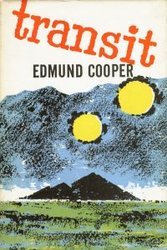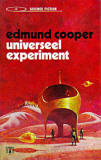
Edmund Cooper, Transit. Faber & Faber, 1964, 232 pp. ISBN 978-0-4418-2206-5
Rating: 8 out of 10
A while ago I was inserting some books that I had bought over the past year into my collection. That’s no trivial task. My books are arranged first by author, then by title. And there’s a lot of them. I don’t know exactly how many science fiction books I have, but the total length of my bookshelves exceeds 36 meters (about 120 feet). Anyway, at some point I stumbled upon an old pocket, a novel by Edmund Cooper, a British author who passed away prematurely in 1982, only 55 years old. It was a Dutch translation of Cooper’s 1964 novel Transit, with “Universeel Experiment” being the translated Dutch title. According to the  notice on the first page, I had acquired it in 1978 and presumably I read it around that time. Most likely that was the second time that I read it, as I had by then devoured every SF book that our local library had to offer. In any case, I had only a faint recollection of the book: it involved a lot of beach and human relationships that included sex (I had a definite recollection of somebody saying “with our tails between our legs” and being corrected by his female companion: “with your tail between my legs, you’ll mean”). A serious adult relationship including sex was, of course, rather unusual for a science fiction novel of that time.
notice on the first page, I had acquired it in 1978 and presumably I read it around that time. Most likely that was the second time that I read it, as I had by then devoured every SF book that our local library had to offer. In any case, I had only a faint recollection of the book: it involved a lot of beach and human relationships that included sex (I had a definite recollection of somebody saying “with our tails between our legs” and being corrected by his female companion: “with your tail between my legs, you’ll mean”). A serious adult relationship including sex was, of course, rather unusual for a science fiction novel of that time.
I also remembered that the story had included something like a competition between Terrans and an alien species, organized by an ancient species overseeing the galaxy, but didn’t really remember any particulars. So I decided to read this book again, almost 40 years after I had bought it (and after having dragged it all over the world through multiple moves, within and between different countries, two of these moves being transatlantic…) At just a little bit over 200 pages (this was long before the time where SF authors would need multiple tomes of 500 pages minimum to get their message across), it didn’t take me long to work my way through it and, I have to say, I was not disappointed.
Sure, there are places where the book shows its age. All four human characters, for example, smoke. And the division of roles is classic: the two men hunt and provide food while the women take care of the camp (and get pregnant). They listen to music using vinyl discs. Those are details, however. Yes, the division of tasks is traditional, but apart from that, the women are smart and full members of the team, something that cannot be said of most SF of that time. In fact, if one would remove those few anachronistic things, the book could have been written just recently. Of course, part of that is because there is hardly any science or technology in the book and what there is, is so advanced that Cooper doesn’t even try to explain things that look like magic (Arthur C. Clarke‘s famous third law).
The story is familiar for a modern reader, because its theme has been explored by several writers (and I even vaguely recall a Star Trek episode with a similar plot, but I may be wrong about that), but this may have been one of the first: a group of Terrans is placed in an unfamiliar environment, in this case a tropical island on a planet in a different solar system, with only minimal resources and tools. On the same island, a group of 4 aliens is dropped at the same time, with a similar lack of resources. Conflict ensues and at the end of the book, it turns out that the winner not only gets to colonize this particular planet, but will come to dominate the whole of our quadrant of the Galaxy.
The story line is rather simple. As I said above, SF novels in those days were not supposed to be too long, so there was no room for secondary characters or secondary story lines. Neither is there any discussion about what drives the other group of aliens, who seem to derive a sadistic pleasure from the suffering of animals or even of the clearly intelligent Terrans. But the story of the four Terrans is interesting enough and the characters are sympathetic, even though only the main character (Richard Avery, a name later used by Cooper as a pseudonym) is fleshed out in more detail. As the story is told through Avery’s eyes, that is to be expected though. Cooper succeeds in bringing Avery to live and, when one of the women miscarries and he has to bury the unborn baby, Cooper’s rendition is touching and almost made me choke up.
In fact, the only major quibble I have with this book is that the other aliens on the island, nicknamed the “Golden Ones”, are completely human-like, despite the fact that they come from a different planet. Of course, it is unlikely in the extreme that aliens evolved in a different solar system would even remotely look like us. However, the story would be very different if the Golden Ones had looked like, say, an octopus, so I am willing to overlook this.
In all, this book provided several agreeable hours of diversion. After more than 50 years, it is still very enjoyable for a modern reader. And I think I should also mention the excellent translation by the noted science fiction author and editor, Carl Lans, even if he sometimes uses a Dutch that sounds a bit archaic to a 21st century ear.